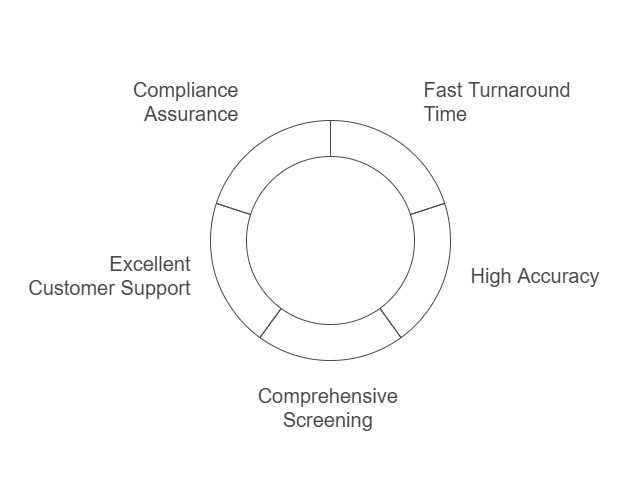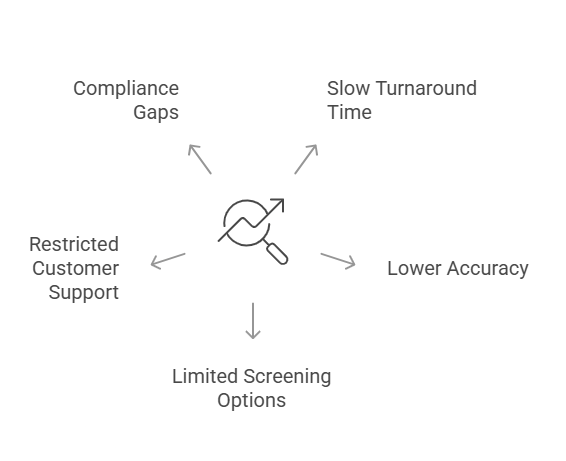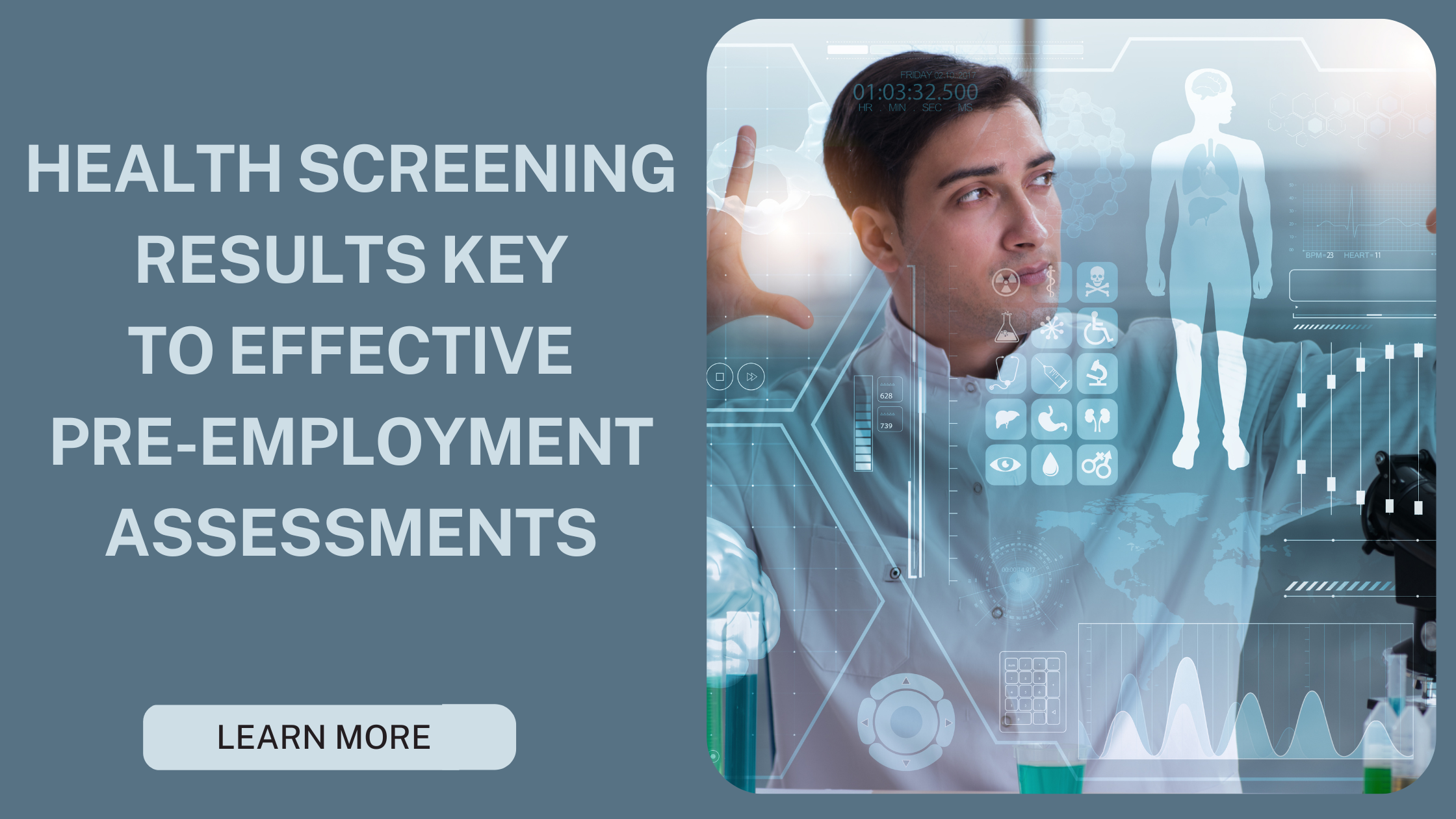Overview of Background Checks and Health Screenings in Pre-Employment
Background checks have become a staple in the hiring process for employers looking to mitigate risk, ensure safety, and verify the integrity of job candidates. These checks help companies assess whether a candidate’s qualifications, criminal history, or previous employment align with the expectations for a role. While many are familiar with criminal background checks and employment verifications, health screenings are becoming increasingly essential in various industries. These screenings are designed to assess a candidate’s fitness for a specific job and ensure that they meet both the health requirements and the safety standards needed to perform well in their position.
Health screenings are critical in pre-employment assessments because they help identify potential risks that could affect the candidate’s ability to perform the job or pose a safety risk to themselves and others. This is particularly relevant in sectors such as healthcare, transportation, and manufacturing, where physical fitness and overall health are integral to both individual and organizational success.
The Importance of Health Screenings in the Hiring Process
Health screenings serve multiple purposes within the hiring process. They can help employers determine whether a candidate is physically fit for a job, check for any pre-existing conditions that might require accommodation, and verify that the candidate can meet the physical demands of the role without compromising safety.

For example:
- Healthcare workers may undergo screenings for infectious diseases or physical endurance to ensure they can handle the demands of patient care.
- Truck drivers or delivery personnel need screenings to check for impairments such as drug or alcohol use, ensuring safety on the roads.
- Manufacturing and warehouse workers are often subject to health checks to ensure that they can safely operate heavy machinery without risking injury or endangering their colleagues.
Health screenings are not just a tool for compliance; they are a way for employers to protect their workforce, reduce workplace injuries, and create a healthier and more productive working environment.
Pros and Cons of Health Screenings in Hiring Decisions
Health screenings are valuable tools, but they are not without their challenges. Below is a breakdown of the pros and cons of incorporating health screening results into the hiring process:
| Aspect | Pros ✅ | Cons ❌ |
|---|---|---|
| Workplace Safety | Reduces workplace accidents by ensuring employees are physically fit. | May disqualify candidates with minor health conditions. |
| Legal Compliance | Ensures compliance with industry-specific health standards and regulations. | Varying health regulations can complicate the process in different states or countries. |
| Cost Savings | Helps avoid potential workers’ compensation claims and lost work time. | Can be costly for employers to administer, particularly for small businesses. |
| Improved Productivity | Ensures employees are physically capable of performing their duties, boosting efficiency. | Results may not always reflect job performance or potential, leading to missed opportunities. |
| Prevention of Health Issues | Identifies health risks that could impact work performance or safety. | Privacy concerns related to health information may arise. |
Why Health Screenings Matter in Certain Industries
Health screenings are particularly crucial in industries where physical health is tied to safety and performance. In healthcare, workers often face long hours and physically demanding tasks, making it essential to assess whether employees are fit for such roles. In transportation, drivers must have unimpaired health to ensure the safety of themselves and others on the road, making health screenings a mandatory part of hiring for such roles. Similarly, in manufacturing, jobs often require lifting heavy objects or operating machinery, which can only be safely done by individuals who are physically fit.
Even in industries where health may not directly impact performance, it is still beneficial to conduct screenings to ensure that employees can perform their job duties without unnecessary disruptions.
Health Screenings and RapidHireSolutions
While many employers handle health screenings independently, some opt for a professional third-party provider like RapidHireSolutions, which specializes in comprehensive background checks, including health screenings. RapidHireSolutions helps businesses conduct these screenings across all U.S. counties, ensuring a thorough and efficient process. The service offers accurate results and complies with federal and state regulations, providing businesses with the peace of mind that their hiring practices are both legally compliant and effective.
Comparison of RapidHireSolutions and Competitors in Health Screening Services
When it comes to health screenings as part of the hiring process, businesses have several options for service providers. In this section, we’ll compare RapidHireSolutions with a competing provider to highlight the strengths and weaknesses of each, helping businesses make an informed decision about their background check and health screening needs.
The key areas of comparison include accuracy, turnaround time, compliance, service comprehensiveness, and customer support. Let’s dive into a direct comparison to see how each provider stacks up.
Key Metrics Comparison: RapidHireSolutions vs. Competitor
| Feature | RapidHireSolutions | Competitor |
|---|---|---|
| Turnaround Time | 1 day ✅ | 15-20 days ❌ |
| Service Accuracy | 99.9% ✅ | ~90% ❌ |
| Comprehensive Screening | Includes health screenings, drug tests, and more ✅ | Limited to basic background checks ❌ |
| Customer Support | 24/7 support, dedicated assistance ✅ | Limited support hours ❌ |
| Compliance | Full compliance with federal and state regulations ✅ | Compliance may vary ❌ |
Let’s Dive into a Proper Analysis
When evaluating health screening services, the efficiency, accuracy, and compliance of the service provider are critical factors for businesses to consider. Below, we’ll break down the strengths of RapidHireSolutions and the weaknesses of the competitor.
Strengths of RapidHireSolutions

- Fast Turnaround Time (1 Day): One of the standout features of RapidHireSolutions is its ability to provide health screening results within 1 day or 24 hours. In contrast, the competitor often takes 15-20 days to process results, which can delay hiring and potentially result in missed opportunities.
- High Accuracy (99.9%): RapidHireSolutions boasts an impressive accuracy rate of 99.9%, ensuring that businesses receive reliable and precise information. The competitor, however, has a lower accuracy rate of around 90%, which could lead to potential errors and misinformed decisions.
- Comprehensive Screening: RapidHireSolutions offers a complete package of health screenings, including drug tests, physical fitness evaluations, and medical history reviews, providing a full scope of data for employers. The competitor only provides basic background checks, missing out on essential health-related information.
- Excellent Customer Support: RapidHireSolutions offers 24/7 customer support, ensuring businesses can get help whenever they need it. On the other hand, the competitor has limited support hours, which could create frustrations for employers who require assistance outside regular business hours.
- Compliance Assurance: RapidHireSolutions ensures full compliance with federal and state regulations, including FCRA (Fair Credit Reporting Act), HIPAA (Health Insurance Portability and Accountability Act), and ADA (Americans with Disabilities Act). The competitor’s compliance can vary, which may create risks for businesses in highly regulated industries.
Weaknesses of the Competitor

- Slow Turnaround Time: The competitor’s turnaround time of 15-20 days significantly slows down the hiring process, creating bottlenecks and potential delays in staffing. This is especially detrimental in fast-paced industries where filling positions quickly is crucial.
- Lower Accuracy: The competitor’s 90% accuracy rate could lead to errors or omissions in health screenings, potentially leading to unqualified candidates passing through or qualified candidates being wrongly disqualified. This could create liabilities for businesses.
- Limited Screening Options: The competitor’s basic background check services fail to provide a comprehensive picture of a candidate’s health and fitness for the job. As a result, businesses might miss out on critical health-related information necessary for making the right hiring decisions.
- Restricted Customer Support: Limited customer support hours can create frustration for employers who need immediate assistance during the hiring process. Delayed responses or unavailable support could result in costly downtime.
- Compliance Gaps: If the competitor’s services don’t meet all the necessary compliance standards, businesses may face legal risks or penalties. It’s essential for hiring processes to be fully compliant with relevant regulations, and this is an area where RapidHireSolutions excels.
Expanding on the Strengths of RapidHireSolutions
RapidHireSolutions stands out for its speed, offering results in just 1 day, which is crucial in today’s fast-paced hiring environment. Companies looking to fill positions quickly without sacrificing accuracy or compliance can rely on RapidHireSolutions to streamline their hiring process.
The accuracy of RapidHireSolutions‘ health screening results ensures that employers can make well-informed hiring decisions. An accurate health screening report reduces the chances of hiring candidates who may pose a risk to workplace safety or productivity, which is especially important in industries like transportation, manufacturing, and healthcare.
Comprehensive health screening services also allow businesses to assess a candidate’s overall health and fitness, not just their ability to pass basic background checks. This all-encompassing approach helps employers make decisions with the full picture in mind, ensuring they hire individuals who are capable and healthy enough to handle the demands of the job.
In terms of customer support, RapidHireSolutions offers a 24/7 dedicated team to assist businesses, ensuring that any questions or concerns are addressed in a timely manner. This level of service adds value by improving the overall client experience.
Finally, compliance is a top priority. RapidHireSolutions ensures that all health screenings and background checks are conducted in accordance with federal and state regulations, protecting employers from potential legal complications.
Legal Considerations for Health Screenings in Pre-Employment Assessments
When it comes to incorporating health screenings into the hiring process, understanding the legal aspects is crucial. Health screenings are governed by a set of regulations designed to protect both employers and employees, ensuring fairness and preventing discrimination. Businesses need to be aware of these regulations to ensure compliance and avoid legal pitfalls.

The most relevant laws for health screenings in pre-employment assessments include the Fair Credit Reporting Act (FCRA), Americans with Disabilities Act (ADA), and Health Insurance Portability and Accountability Act (HIPAA). Here’s an overview of how each of these laws affects health screenings in hiring decisions:
1. Fair Credit Reporting Act (FCRA)
The FCRA governs how employers use third-party agencies to conduct background checks, including health screenings. It ensures that employers obtain written consent from candidates before conducting any background checks. Additionally, the FCRA mandates that employers provide candidates with a copy of the report if they decide not to hire them based on the results. Non-compliance with FCRA guidelines can lead to legal action and fines.
2. Americans with Disabilities Act (ADA)
The ADA prohibits discrimination based on a candidate’s disability status. While health screenings can be used to assess an applicant’s fitness for a job, employers must be careful not to disqualify candidates solely because of a disability that does not affect their ability to perform the job. Employers are not allowed to ask about disabilities during the hiring process, and health screenings should only focus on whether the candidate can perform the essential functions of the job.
3. Health Insurance Portability and Accountability Act (HIPAA)
The HIPAA ensures the confidentiality and privacy of an individual’s health information. When conducting health screenings, employers must ensure that any health-related data they collect is handled securely and not disclosed to unauthorized parties. HIPAA compliance is crucial when handling sensitive information during the background check process.
Frequently Asked Questions (FAQs)
1. What is included in a pre-employment health screening?
A pre-employment health screening typically includes a review of the candidate’s medical history, a physical exam, and potentially drug or alcohol testing. It may also include vision and hearing tests, physical fitness assessments, and screenings for certain medical conditions that are relevant to the job.
Are health screenings mandatory for all jobs?
Health screenings are not mandatory for all jobs, but they are especially important for positions that require physical labor, handling hazardous materials, or operating vehicles or machinery. Jobs in industries like healthcare, transportation, and manufacturing often require health screenings to ensure candidates are fit for the role and can perform essential duties safely.
How do health screening results impact hiring decisions?
Health screening results can impact hiring decisions by providing employers with information about a candidate's ability to perform the job safely and effectively. A clean health screening result may help an employer confirm that a candidate is fit for the job, while red flags may indicate a need for further evaluation. However, employers must ensure that health-related decisions comply with laws like the ADA and FCRA, ensuring that they do not discriminate against candidates based on their health conditions, unless those conditions impact the ability to perform the job.
Can health screening results be used to reject a candidate outright?
Health screening results should not automatically disqualify a candidate unless the findings indicate that the individual is unable to perform the essential functions of the job. Employers must evaluate whether a candidate's health condition truly impacts their ability to do the job and ensure they are in compliance with the Americans with Disabilities Act (ADA). Decisions based on health screenings must be job-related and consistent with business necessity.
How can I ensure the confidentiality of health screening results?
To maintain confidentiality, employers must follow HIPAA guidelines, which require the protection of health information. Health screening results should be kept in a secure, confidential location, and only authorized personnel should have access to the data. Employers should also ensure that any third-party background check providers they work with are compliant with privacy laws to prevent unauthorized disclosure of sensitive information.
Conclusion
Incorporating health screenings into the pre-employment process plays a critical role in ensuring that employers hire candidates who are physically and mentally capable of performing their job duties. Health screenings provide valuable insights into a candidate’s fitness for the role, helping businesses maintain workplace safety, productivity, and compliance with legal requirements.
For businesses looking for fast, accurate, and compliant health screening services, RapidHireSolutions offers a comprehensive and efficient solution. With a quick turnaround time of 1 day or 24 hours, high accuracy, and full compliance with federal and state regulations, RapidHireSolutions ensures that employers can make informed hiring decisions. Their commitment to customer support and thorough health screening services makes them an ideal choice for businesses seeking reliable background checks and health screenings for pre-employment assessments.

